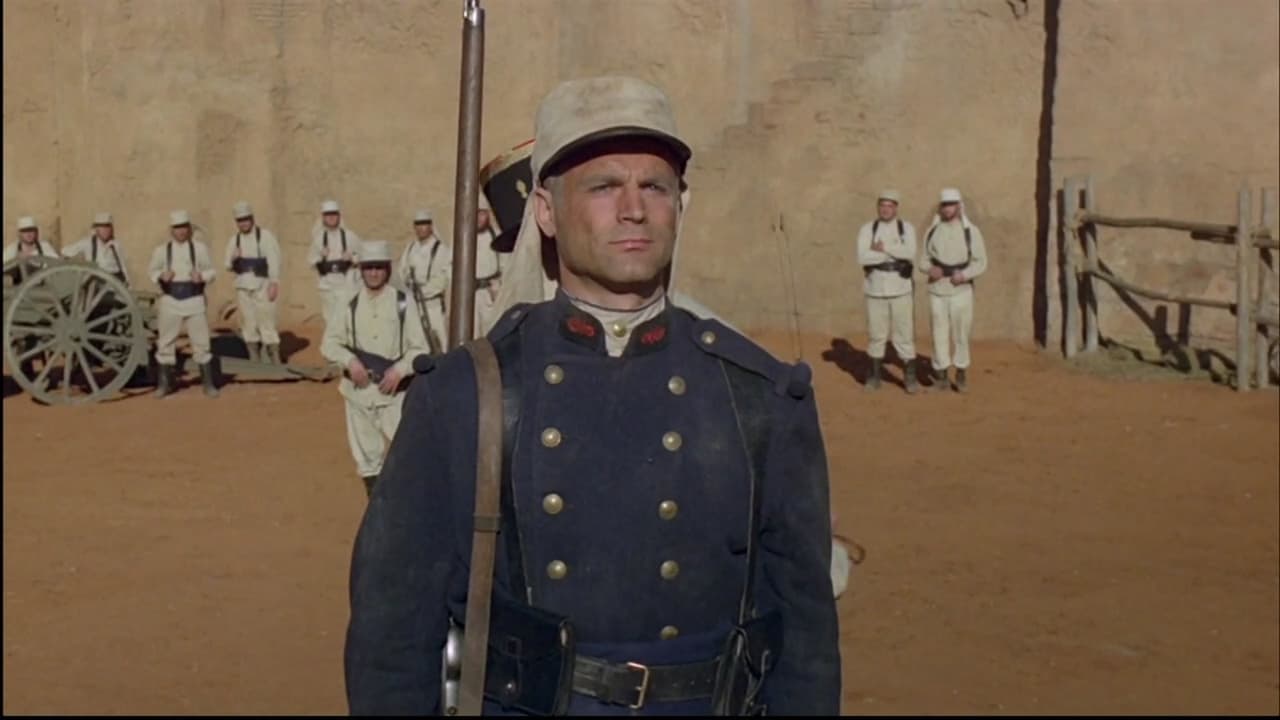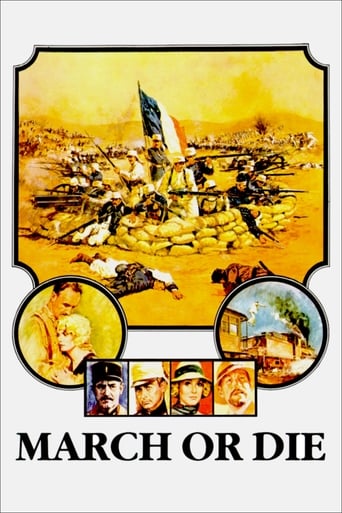Eric-1226
This movie *could* have been as epic a movie as, say, "Apocalypse Now," "Lawrence of Arabia," or "Platoon." Instead we have a colorful, atmospheric period piece, set largely in the Moroccan desert, that plays like a wealthier version of "The Siege of Firebase Gloria." Not that that in itself serves to denigrate this movie. Not at all. Heck, "The Siege of Firebase Gloria" is a pretty decent war pic in its own right. It's just that I get this nagging feeling, that "March or Die," with a little extra input on production values, wider desert shots, more background flashbacks, etc., *could* have been a much more memorable, larger-than-life sort of picture.But what "March or Die" lacks in the sheer epic expanse of other big-name war movies, it more than makes up for with carefully measured performances by the principal characters, not the least of which is that turned in by Gene Hackman, who plays a certain Major Foster - a cynical but nonetheless highly disciplined former American officer, booted from the "vaunted" army of America, who has found his military niche in the austere, almost mysterious world of the French Foreign Legion.How exactly a Yank ends up in command of a Foreign Legion battalion leaves a little to the imagination - or at least prompts the viewer to make the necessary allowances for artistic license. True, the FFL was, and is, open to recruits from just about any country, but most of the officer ranks are usually reserved for the French. Some of the officers do in fact work their way up from the bottom, so maybe this explains Major Foster's leadership position.In any case, I felt it was one of the better performances of Hackman's career. Though his Major Foster is an officer clearly under a lot of personal stress, with a lot of "ghosts in his closet," Hackman carefully avoids the temptation to imbue this man with excessive amounts of passion that I seem to associate with a Gene Hackman performance. And it works well in this movie, because he is *supposed* to be a man of discipline. In fact one of his more memorable lines in the movie is when he reminds a group of unruly recruits, on their way to joining up with the Legion, that "the Legion is the most disciplined army in the world." The movie itself is a fairly engrossing mixture of military action and political intrigue - namely, certain powers in France saw fit to use Major Foster's Legion battalion as a sort of "protection squad" to help protect a vital archaeological dig in the Moroccan desert, on lands traditionally inhabited by various Arab tribes. Neither the Arab tribesmen, nor Major Foster himself, are really too keen on the prospect of foreigners coming in to usurp other peoples' wealth. But Major Foster, ever the military man in spite of creeping cynicism, does what he is told, or, as he coldly explains to El Krim, the leader of one of the militant tribes (nicely played, oddly enough, by British actor Ian Holm): "A soldier goes where he is sent." A very interesting host of characters comes into play throughout the movie, including Max Von Sydow as the archaeologist intent on digging up the treasure in the desert - not only for the glory and coffers of France, but, we can assume, for his own personal aggrandizement. The Legionnaires themselves are an odd and, at times, colorful lot, much as you'd expect from a disparate group of desperate lads, all seeking anonymity, adventure, escape, redemption, or whatever else it is they expect to find in the Foreign Legion: there is Marco, a slippery jewel thief who seems to con his way in and out of everyone's life, but nevertheless has a heart of gold (though, at times, you wonder if he didn't steal that gold in a heist); there is a tragically inept soldier known only as Top Hat, a former musician whose background and reasons for being in the Legion are never really explained; there is a hard-as-nails battalion officer, a certain Lt. Fontaine, who gives no mercy to the troops, and expects none in return - only discipline. There are assorted other nationalities represented in this odd mix of Legion troops, including a young British lad who meets a particularly unpleasant fate at the hands of the Arabs; a handful of ex-German soldiers, joining up after Germany's defeat in the recently-ended Great War; and also an expatriate Russian, named Ivan, who seems to represent some of the human global spillage caused by the Russian Revolution, just then occurring in his homeland. The Legion seems to be not only the best, but perhaps the only, place for him, and the rest of them, to call home.Last but not least is beautiful Catherine Deneuve, in a minor role, playing a war-weary French widow, thrown into this Moroccan mix due to circumstances beyond her control. I really liked her appearance in this movie. Though she didn't have a particularly heavy part, I would not call her the obligatory female "fluff" - she did in fact add some balance and nuance to the story that, for me anyway, was really quite meaningful.The movie ends with an epic battle scene reminiscent of other siege-type movies, where the onslaught of seemingly endless streams of enemy soldiers against a thinly-defended garrison IS the battle royale, the raison d'etre of the entire movie. The battle scene is well-done and ultimately poignant. In fact, the entire movie was well-done and poignant. It just seemed to be lacking those few extra points that snatched it from the jaws of greatness. Be that as it may, it is a great war movie worth seeing by any die-hard war movie fan. And if it prompts you to study further about the history of the French Foreign Legion, as it did me, then, so much the better.
MARIO GAUCI
My first viewing of this one came via a local TV screening back in the early 1980s when we still only had a black-and-white TV set and the film has virtually vanished without a trace from TV screens since then. I had originally intended to revisit it over the Christmas period – along with other exotic adventure films I've seen at the time like CHU-CHIN-CHOW (1934), ABDUL THE DAMNED (1935) and FORT ALGIERS (1953) – but I had to postpone those plans; now that I've watched the "Carry On" spoof of Foreign Legion films, FOLLOW THAT CAMEL (1967), it seemed an appropriate time to give it another look. Obviously, I don't usually go for pan-and-scan transfers of widescreen films but, as I said, this film has become such a rarity that I leapt at the chance to watch this one again on the R2 DVD I found at a local rental store.Anyway, during the 1970s it became fashionable to revive old Hollywood genres and the master at this game was Peter Bogdanovich but, equally successful, was Dick Richards with his Philip Marlowe adaptation FAREWELL, MY LOVELY (1975); unfortunately, both directors would soon have a dud on their hands – Bogdanovich with the musical pastiche AT LONG LAST LOVE (1975) and Richards with MARCH OR DIE! Rewatching it now, it's hardly as disastrous as its reputation would have you believe: in fact, I thought that, shot by shot, it was quite well directed. What it clearly needed was a more exciting plot, a less predictable narrative and, most importantly perhaps, a more suitable leading man. While personally I got a kick out of seeing childhood favorite Terence Hill (i.e. Italian Spaghetti Western/action-comedy film star Mario Girotti) share the screen with such acting heavyweights as Gene Hackman, Catherine Deneuve, Max Von Sydow and Ian Holm, his light touch was clearly inadequate for the role of the thief-turned-soldier who falls foul of his misanthropic Captain (Hackman) but is soon consoled by a French belle (Deneuve).Deneuve made one of her infrequent appearances in an English-speaking film and, while her character is not exactly given much to do, she is more "troubled" than she at first appears: she is fascinated by the old lady in the whorehouse (shades of BELLE DE JOUR [1967] perhaps?) and sacrifices herself to Hackman in order to save Hill from dooming himself for her love (as others had done before him); Von Sydow also antagonizes Hackman in his quest to unearth the priceless archaeological relics found in the desert – which, to the latter, belong to the Arabs (who are more than welcome to them) and, being a renegade American, sees no point in increasing the glory of France through the loss of the lives of his men (most of which are also foreigners); Ian Holm plays the cultured but ruthless Arab leader and, it was also nice to see Hackman share the screen once more with Marcel Bozzuffi (whom he had famously dispatched in THE FRENCH CONNECTION [1971]) and Jack O' Halloran (who would go on to play Non, one of the villainous Kryptonian trio in the first two SUPERMAN films); the latter was also in Richards' FAREWELL, MY LOVELY and I recently had the pleasure to talk to him on this very Forum about the film under review itself! As usual, the film-makers' heart was set in the right place given their employment of, not just the star-studded international cast, but also cinematographer John Alcott and composer Maurice Jarre but, as I said earlier, their good intentions were let down by a fairly routine plot which, despite the occasional, valiant interjections of existentialism a' la the previous year's THE DESERT OF THE TARTARS (which also featured Max Von Sydow and an unusually strong role for Italian heart-throb Giuliano Gemma!), fails to coalesce into a memorable or entire successful whole. Gene Hackman once said about MARCH OR DIE that the audience marched in and the film died: maybe they just couldn't take it seriously after seeing the whole Foreign Legion genre being sent up (yet again) on the screen just a few months earlier in British comic Marty Feldman's directorial debut, THE LAST REMAKE OF BEAU GESTE (1977)...

